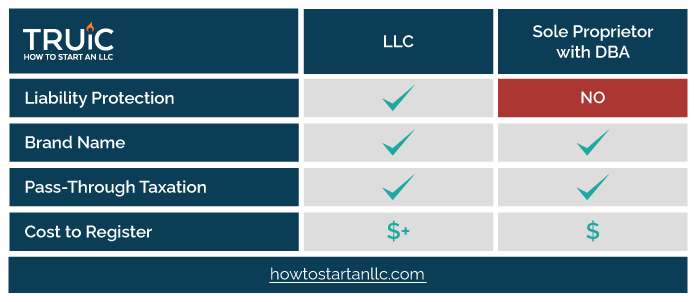What Is a DBA?
DBA means "doing business as." A DBA is any registered name that a business operates under that isn't its legal business name. A DBA is sometimes called a trade name, fictitious name, or assumed name.
A DBA isn't a business structure and doesn't provide any personal asset protection like an LLC or corporation. Visit our DBA vs LLC guide to learn more.
For step-by-step instructions on how to get a DBA for your small business, visit our How to File a DBA guide and choose your state.
Recommended: Use LegalZoom to apply for a DBA and establish your brand.

Do I Need a DBA?
A DBA isn’t required to form or run a business. A DBA is an assumed or fictitious business name that is sometimes used by sole proprietors, partnerships, LLCs, and corporations for branding purposes.
There are mainly only two reasons why you would need a DBA:
- You have a registered formal business entity looking to branch out into new products, services or brands, or to rebrand in general.
- You have an unregistered business such as a sole proprietorship or partnership and would like to operate under a name other than your personal name. This option should only be used by businesses with very low profit and risk.
DBA Meaning
A DBA, also known as a trade name, fictitious name, or assumed name, allows you to conduct business under a name other than your legal business name.
Common DBA Misunderstanding
First-time entrepreneurs often confuse DBAs with a type of business structure. They assume that when they register a DBA, they are creating a formal business structure with liability protection but this is not the case.
When an entrepreneur starts a business and only registers a DBA name, they are actually just creating a sole proprietorship with a DBA name.
The DBA name helps with banking and branding the business, but the business owner’s personal assets are still completely exposed to lawsuits and creditors.
A sole proprietorship with a DBA name is still just a sole proprietorship—your personal assets are not protected by registering a DBA name.
If you have a sole proprietorship, it is easy to convert to an LLC.
Subscribe to our YouTube channel
LegalZoom offers packages to easily register your DBA starting at $99 + state fees.
What Are the Advantages of a DBA?
The benefits of using a DBA can vary depending on the type of business structure you have.
DBA Benefits for Sole Proprietorships and Partnerships
Registering a DBA name for a sole proprietorship or partnership is good for branding but it doesn't provide the most important benefit—personal liability protection.
Forming an LLC or corporation is the best choice for a business owner that expects to earn a profit or carry any risk. LLCs and corporations can protect your personal assets in the event that your business is sued or can't pay creditors.
There are three main benefits to using a DBA name for a sole proprietorship:
-
Expanded Branding
-
Increased Privacy
-
Access to Small Business Banking

Branding
Without a DBA, a sole proprietor or partnership must operate under their personal name(s). A sole proprietor's personal name is their business name by default.
With a DBA, "John Smith" can market himself under an assumed name like "Advanced Photography".
You can learn more about branding in our How to Name Your Business guide. Our business name generator and logo maker are useful tools for branding your business.
Privacy
When you file a DBA name, the general public doesn't see your surname, only your fictitious business name.
Banking
You can accept payments in the business's name rather than your surname. This can increase trust and credibility.
DBA Benefits for LLCs and Corporations
Formal business structures like LLCs and corporations don't need to file a DBA name to use a brand name, bank in the LLC name, or to create privacy. Those things are a standard part of those business structures.
The most important benefit is that DBAs allow formal business structures to create multiple brands (business names) or lines of business under one LLC or corporation. They can also be used to rebrand an LLC or corporation rather than change the main legal business name.
LLC DBA Example:
If "Babe's Hardware, LLC" wanted to expand into furniture sales and restoration, the owner(s) might file for the trade name, "Babe's Furniture." This would allow them to promote the business as a furniture store and accept payments under the name "Babe's Furniture".
How Do I Get a DBA?
The process for registering a DBA name varies from state to state. In many states, you will file DBA forms with the secretary of state or the county clerk for a cost of $10 to $100. You may also need to publish notice of the DBA in a local newspaper.
You can learn how to file a DBA with our state guides or have a DBA filed on your behalf by using one of these DBA filing services.
Remember, a DBA does not offer personal asset protection for your small business. To get personal asset protection most entrepreneurs choose to structure their new business as an LLC.
LegalZoom DBA Service
LegalZoom remains one of the most well known service providers in the industry and has excellent reviews on trustpilot. Their DBA filing packages begin at $99 + Filing Fees.
- Alabama
- Alaska
- Arizona
- Arkansas
- California
- Colorado
- Connecticut
- Delaware
- Florida
- Georgia
- Hawaii
- Idaho
- Illinois
- Indiana
- Iowa
- Kentucky
- Louisiana
- Maine
- Maryland
- Massachusetts
- Michigan
- Minnesota
- Mississippi
- Missouri
- Montana
- Nebraska
- Nevada
- New Hampshire
- New Jersey
- New York
- North Carolina
- North Dakota
- Ohio
- Oklahoma
- Oregon
- Pennsylvania
- Rhode Island
- South Dakota
- Tennessee
- Texas
- Utah
- Vermont
- Virginia
- Washington
- Washington D.C.
- West Virginia
- Wisconsin
- Wyoming
DBA FAQ
A DBA (doing business as) allows a business to operate under a name different from its legal name.
A DBA allows sole proprietorships to operate under a name different from the owner’s legal name, which can make the company appear more professional. DBAs can also be useful when a company wants to introduce a new product or line of business under a different name but doesn’t want to create a new legal entity.
The DBA filing process differs state to state. In some states, companies file for DBAs at the state level, while in other states, companies must file for DBAs with the cities or counties they operate in. To learn how to form a DBA in your state, check out these state-specific guides.
A DBA is not a separate legal entity, so it does not have to file separate taxes. All business conducted under a DBA is part of the legal entity for tax purposes.
No, it is not necessary to have a separate bank account for a DBA that operates under an LLC. However, if your DBA is for a sole proprietorship, it is a good idea to have a separate business bank account.
Visit our Best Banks for Small Business review for help choosing the best bank for your small business.
The price varies state by state, but the cost of a DBA is typically between $10-$100.
The right choice between getting a DBA for your sole proprietorship/partnership or forming an LLC depends on your business’s unique situation and needs. Operating a sole proprietorship under a DBA name is a simpler, more economical option in the short term, but an LLC offers VERY important advantages such as personal liability protection. You can learn more about this topic in our DBA vs LLC guide.
An example of a DBA would be a sole proprietorship carpentry business owned by John Doe doing business under the name Best Cut Carpentry.
You should write your DBA name exactly how it is registered.